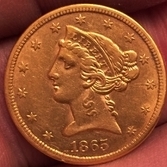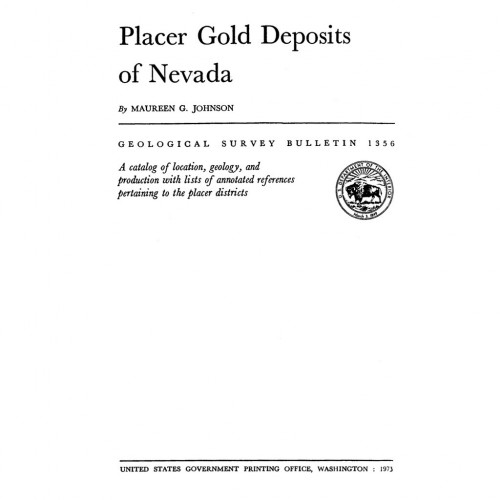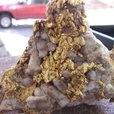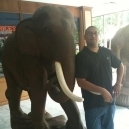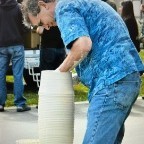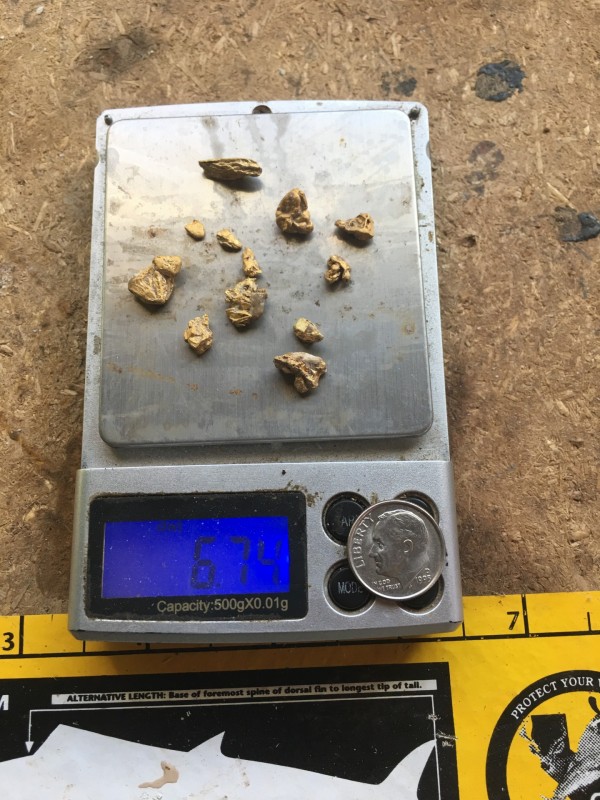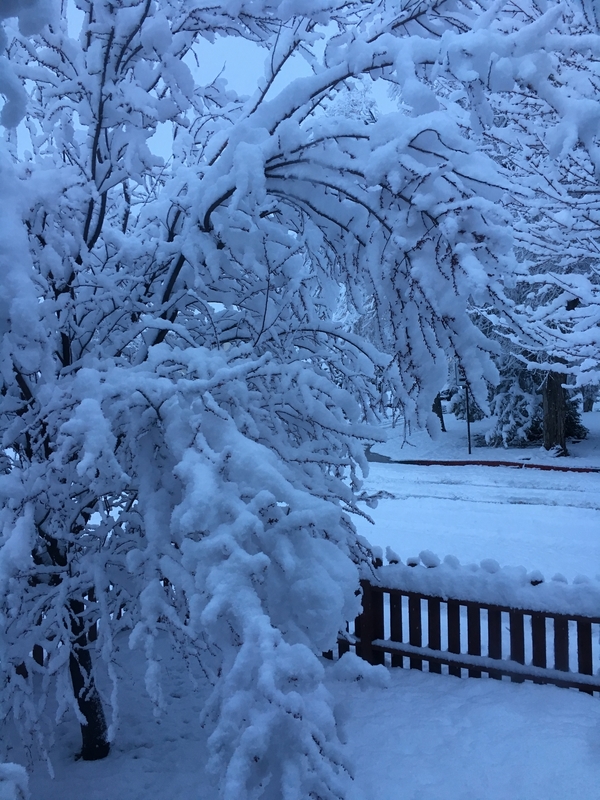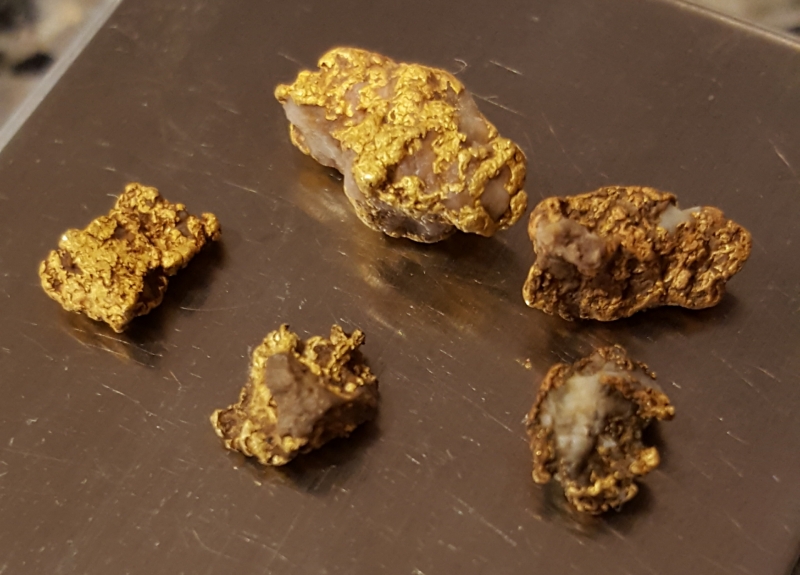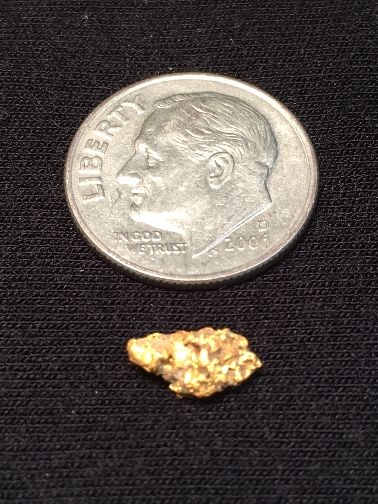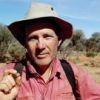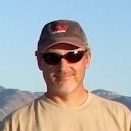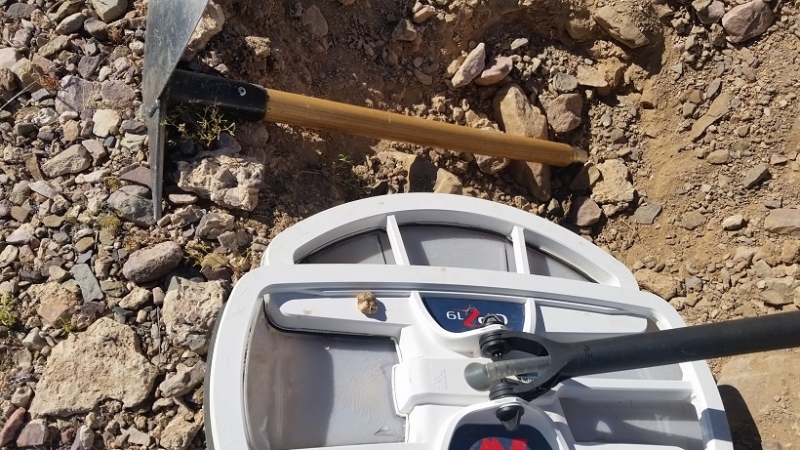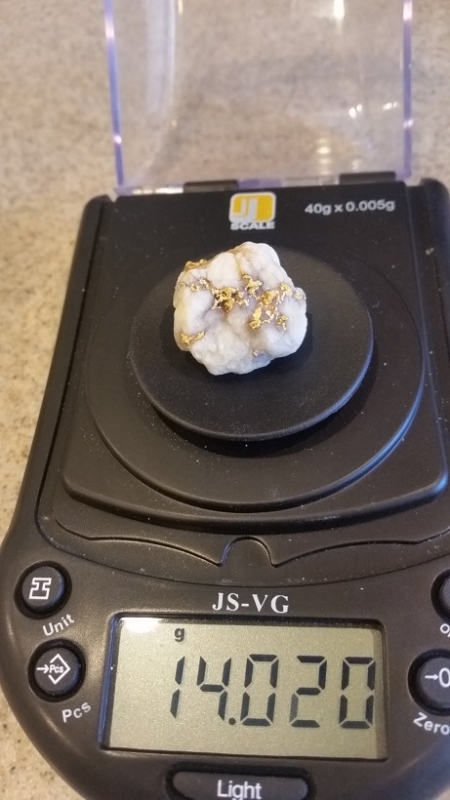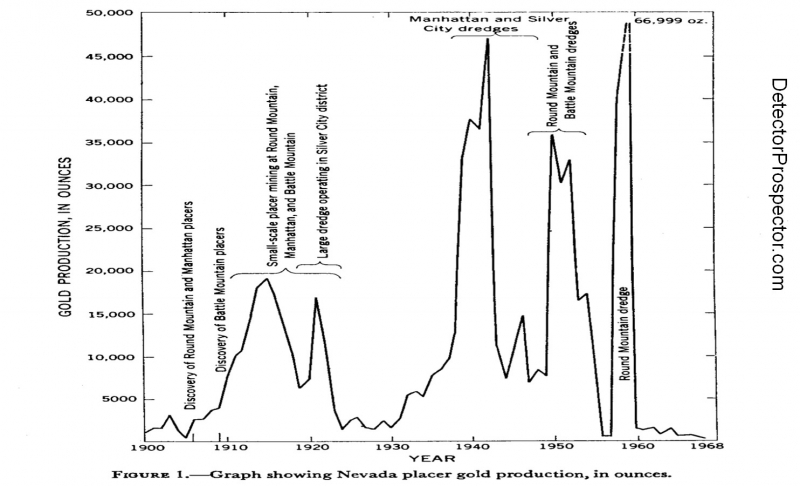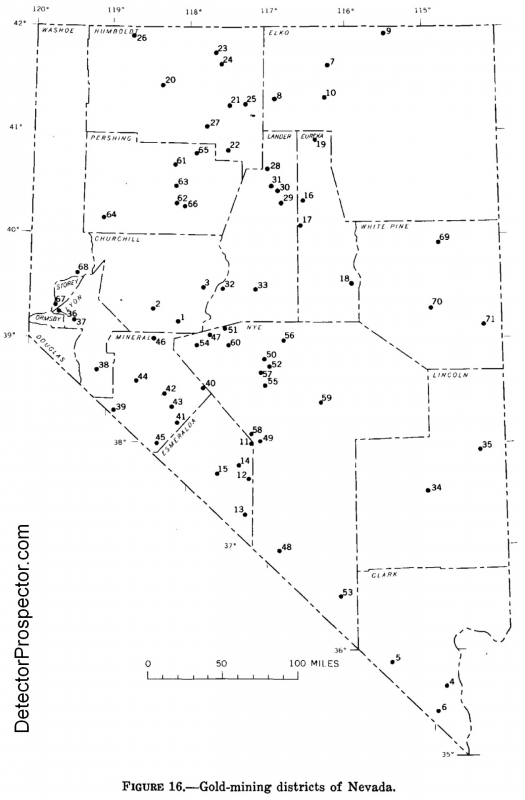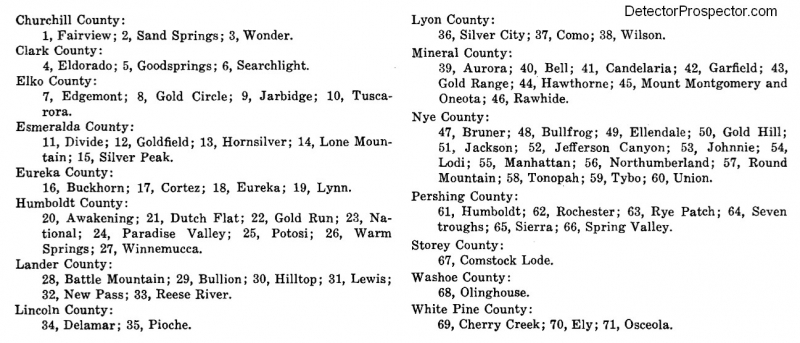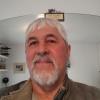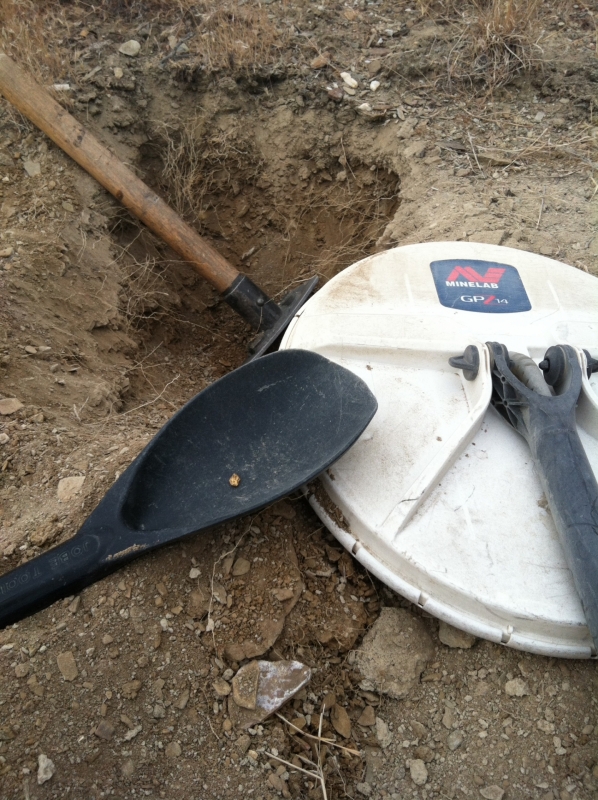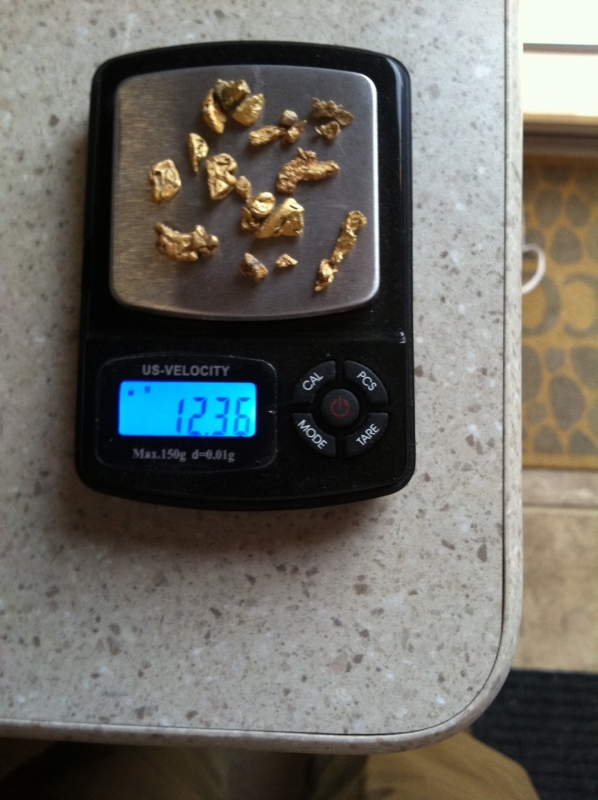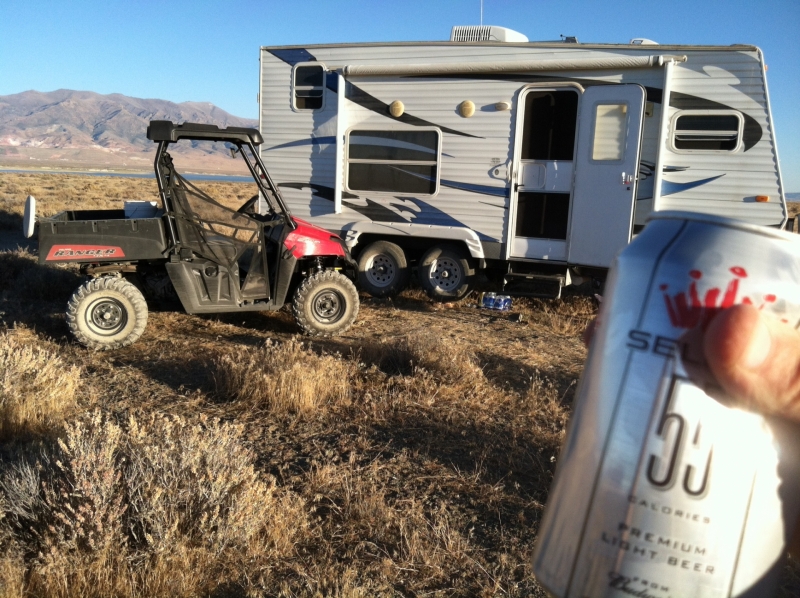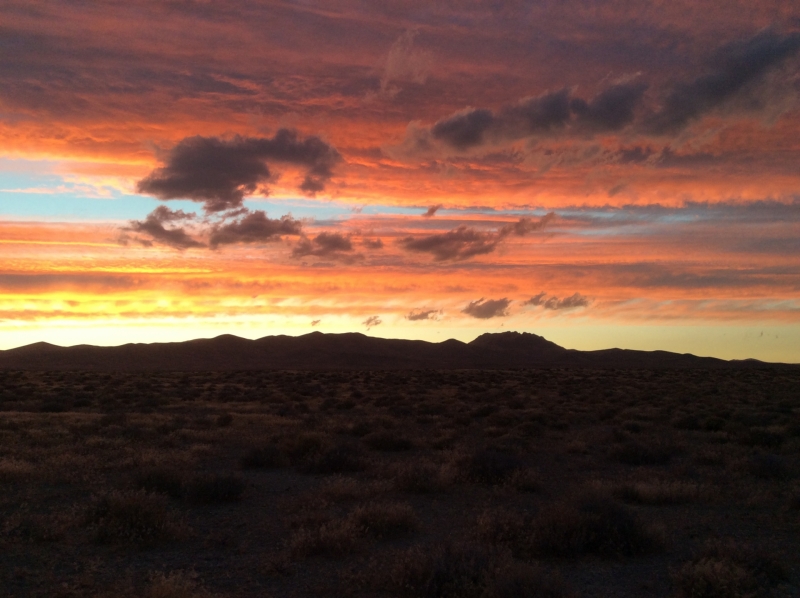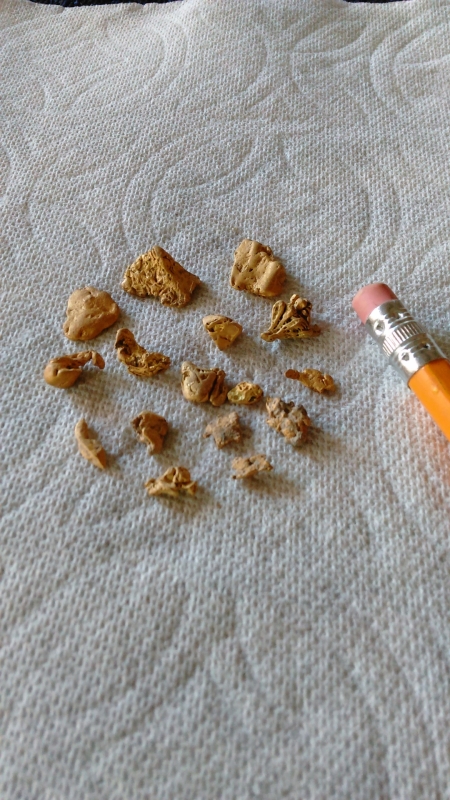Search the Community
Showing results for tags 'nevada'.
-
Driving to Vegas from NorCal for a company conference and taking a few extra days to fit in some detecting to and fro ? Nox and MMK loaded, along with 6" & 15" Nox coils, and the 7" concentric MMK coil, lots of iron patches to try, some other areas more sparse with targets, yet great finds have been made in those fields, so hopefully the EQ800 with the 15" coil will light that field back up (Tom bagged a gold coin from it and I've dug a key couple of date seateds). Some other areas I want to try, including an area I suspect may have been a wagon gathering campsite, the 15" coil will come in handy for zig zagging through this area to see if there's any signs of past life to confirm my wagon campsite theory. Another area we detected in the past where I dug a super deep piece of indian trade silver, the type you see more of back east. It was super deep, and the silver was heavily tarnished and kind of crinkled up. I thought it was a junk metal tag from something modern, and it wasn't until I got it home and was cleaning my finds that I figured out the treasure I'd dug. Tom and I detected that site again and didn't find much, so he wrote it off, and I have to agree it's not promising, but given how deep this big trade silver piece was, I think the 15" Nox coil might light up something our 11" coils missed (Exp2, F75 and Racer2), it's a long shot. It's always fun to hit your old sites with your new machines, each one brings something different to the table, finding stuff your other machines didn't for whatever reason.
-
Version 1973
118 downloads
Placer Gold Deposits of Nevada by Maureen G. Johnson (USGS) 1973 USGS Bulletin 1356, 2.93 MB pdf file, 122 pages A catalog of location, geology, and production with lists of annotated references pertaining to the placer districts of Nevada. Gold Panning, Sluicing, Dredging, Drywashing Forum -
Long but Interesting... "Go Big" or Go Home! ?Enjoy! Ig
-
"Some stories are worthy of being told more than once. There are countless stories about lost or buried treasure in Nevada history. Most of these are legends that might or might not have any basis in fact. The following story, however, is one of the rare cases where a real treasure was found, when there was no previous knowledge it even existed." Full Story Here
-
Hello everyone. I haven't really gotten out to use my detector since buying it last year spring time (Garrett AT Gold). I'm not sure exactly how to use it and would love some pointers or would be very happy to get with someone local and teach me some pointers. I am a GPAA member and I am thinking about going to the claim they have out by Rye Patch next Tuesday Dec 04. I have never been out to that area so any info on that would be appreciated as well. Thank you very much and have a great week.
-
I got permission to hunt some private property on the Nevada Utah border from a guy that owns 60 acres down in the bottom of a ravine, I think the area may also have flowing water. The area has gold mining history with a hard rock mine nearby although I know very little about the area except some deposits were discovered as late as the 1980’s and the gold reports I’ve found are very incomplete of numbers as the activity seems to have been limited. it’s a long drive, but I think I have 4x4 access into his property and may just have to drive up and put boots on the ground and look around. From google earth the area is very volcanic as is most of the desert and other minerals have been mined as well from what I’ve read, zink, copper, silver other than gold. I’ve been researching the diggins , land matters and my n Nevada mines guide, Anyone have a any idea about the detectable nature of gold from that part of N Nevada?
-
Years ago, when I started to hunt Rye Patch I knew it was well past it’s hey days! Yet, I continued to see nuggets being found there by others Prospectors! Our group, finally started to pop some gold after wearing out several sets of boots and skid plates on our old trusty GPX’s. With the new generation of Minelab Detectors, SDC 2300 and the GPZ 7000, it was a new game. Having cut our teeth on the learning curve of both new detectors on the California side of the hill, we set our sites to Northern Nevada. Multitude of hours by our group to establish productive ground and techniques with our GPX’s, lead our new detectors to what seemed like brand new patches of gold. This last outing was no different! One of our hunting members had a moment of Total Recall and remembered a few years back that we found a few nuggets in a spot with our old GPX’s. Well we hit the spot swinging and soon our detector’s started to sing back to us! Now remember, I was out there a couple weeks ago, trying to track down a couple new spots for this group hunt trip. I didn’t find any new spots on that trip and we didn’t even hunt the old spots on this trip, which I did good on. Now, there is only one way to run the SDC and that’s turn it on, it’s and incredible detector and the operators of it on this trip pulled teens of nuggets with it. But, you have to know the variable sounds of the SDC when you run the coil over a target that set you apart from others swinging the same machine over the same dirt. It’s the same with the GPZ 7000, you really can’t run it wrong, just turn it on! You make it run for you and your inner self. Sure I have settings, I like and so does everyone in our group of Prospectors. You have to know what it’s telling you if it’s a target or not, there isn’t many Duck nuggets left in any old gold field(s). Air testing or burying a test nugget does not reproduce any of these nugget signals (tones). I’m still learning tones of the GPZ and will never be and expert of them. The sweet tones of a nugget, I do have lock in my mind is what keeps me and boot makers happy! Lucky...No - spend the time in your local gold field, might take a few pairs of boots, skid plates and multitudes of digging holes in hot ground and rocks to learn the tones of your settings of your detector. We had a great time, even though the wind was crazy windy and made Detecting a challenge - Persevere, press on regardless! Until the next hunt Here’s Robin’s and my 2 1/4 day hunt total in dwts
-
Anyone planning to go to the Rye Patch Nugget Shoot Out in September? Now that I have the EQ800 we're thinking about going to check it out. HH, Brian
-
I have heard a lot about Rye Patch Nevada and now that we are retired the wife and i are thinking about taking a trip down there so i can do some detecting for nuggets? We have a 4x4 PU and small 18' camp trailer. Are there areas you can get to with a trailer and set up close to where you want to hunt. Is it even possible to get a trailer in there? Can anyone go and hunt? We are thinking about some time in May, weather in Oregon and over the passes permitting. Any chance some of you might be there and be willing to give a new comer some tips on nugget detecting. I have a Minelab GPX 4000, a Minelab Gold Monster 1000 and a Whites Gold Master V-sat. all of which i need a lot more experience with. Hope to see some of you there.
-
-
Poured rain here all night in Reno. Supposedly 3-4 feet of snow up in the high country - we will see when the clouds lift! We are off to a mild start and I am still out detecting, though I have mostly shifted gears to coin and jewelry detecting. I hope to stay active detecting through the entire winter - if not through mild weather here then by driving to where it is milder. It is heading into summer in Oz. Soon it will be too cold here for detecting in northern areas. And soon it will be too hot to go detecting in parts of Australia! On the other hand temps are just right for the folks down in Arizona. There is always someplace gold is being found. How are those of you who are facing an “off season” planning on dealing with it?
-
Made it out for half a day yester to an old patch. My buddy dave let me borrow his big coil for the GPZ and i wanted to give it a shot. Good news, i scored 3 nuggets with it, bad newsI have a 9 in metal plate in my hip that sounds off every time i moved the coil to my right. Almost impossible to hold the coil far enough away to avoid the signal. Put heavy strain on my back trying to do that. So I switched coils and tried bumping up the sensitivity to 18 ground normal. I managed to get a couple more pieces. 4.6 gram total. Big was 2.2. I had found out my girlfriends brother is a closet prospector lol. He watches all thr shows but has never found any color. So i lent him my GMT and taught him my dig, rake, detect technique and he got 7 pieces for about a gram and a half. We werent getting cell service where we were and he didn't want his wife to worry, so we packed in early at 1:30. I text my girlfriend we were on our way. She asked why so early, and i told her Jason got sick. She text back with concern asking if was the heat? I replied "hes got a bad case of gold fever" lol in which she replied that i am a dork. I guess i am. Chris
-
Sure, it's a little early in the season for more than just a morning hunt in the High Desert! I loaded up my truck with my gear added 4 blocks of ice and a case of frozen water bottles in my big cooler. Many asked me, how long are you staying, when my ice melts or I melt is my normal reply! Rudy, is game for any weather, as I was at his age, but now I'm looking for a shade tree to get me thru the hot part of the day...no luck in this area for a tree! Rudy, met me early to start the hunt where we left off with his 8 plus dwt'er and run of nuggets. The ground is perfect to hunt for the deep nuggets and Rudy had 5 dinks before we moved to another Patch for a change of scenery! And hour there with Sun beating what brains we had left, we decided to swing some new ground with no luck there. So, we headed back where we started the morning. I popped two dinks and I seen Rudy starting to dig a big wide and deep hole. He told me it has to be trash? I walked over and I could tell by the dirt and his screaming machine that it wasn't trash even though I tried to talk him into filling the hole up and don't waste his energy! He is much to seasoned for that line. I walked over and got the monster pick from my RZR and we started busting the shale to the target! Finally, out of the hole and into Rudy's hands was a handsome 5.70 dwt nugget at 20". This type of hunting takes time and we bust a bunch of holes chasing Threshold variations for a fat deep nugget. A couple more days later, I still had plenty of ice, but no gas left in my tank! Of course we ran into Ms Peg and a new buddy Brian from Reno...everyone had gold in their pokes! Until the next hunt LuckyLundy
- 12 replies
-
- 21
-

-

-
1 hour ago I took a little video (frame capture below), a dry lightening storm came through and my how things can change in less than an hour. Yay... no more scrub, break out the GPZ-19 Sorry, couldn't resist. Jen
-
Just got back from 4 days at southern end of Rye Patch, whew, its getting hard to make finds there anymore. This nugget was covered in stone to start with and only gold peeking out one side of it, after the acid bath it weighs .55 gm. Found at 8" deep with gpx4500 and Evo 14x9, love that coil. Even found a #9 birdshot with it one morning. Another guy with us got a 1.13 grammer at 8" with his GPZ7000. That was it for our group.
-
Got out for my first nugget hunting trip since getting back from my "Snowbird" gig in FL (loved it!). Spent several days looking for new areas and patches.....skunked at Rosebud/Rabbithole, and wandered seemingly aimlessly along the outer edges of Rye Patch where I did stumble across a nice little nugget all by itself...unfortunately not a new patch :-( So hunkered down and got in the "zone" to hit some of my hammered areas......and the zed didn't fail me! Here's some pics...
-
I spent last week in and around Rye Patch. The weather was variable with rain, sleet, snow flurries and freezing wind chills...with occasional sunshine. Some days I was shivering and some times too hot, that is why I dress in layers... I found 4 nuggets and earned two from a "pot day"...no, not the kind you smoke-the kind you share! Tom liked to keep the group efforts and fun factor going so he invents these little contests...it was fun being sociable ! Hanging with the guys something is pretty new to my world. anyway I got a decent photo of this little guy-they usually run like the wind but this guys posed very nicely...there is always more to gold hunting than the gold
- 14 replies
-
- 19
-

-
Got out Friday, and decided to use the good ol Boat Anchor 19 " coil on the ZED. After finding the Specimen Gold, and into it 2 hours, my Bungee broke, and I had to go to my backup bungee, and also switched back to the 14". I was using the High Yield Mode with the 19" coil, since the soils here are not to bad, and I seem to get a little more depth using the 19" with High Yield. Dave.
- 15 replies
-
- 23
-

-
- nevada
- minelab gpz 7000
-
(and 2 more)
Tagged with:
-
From Placer Gold Deposits of Nevada, USGS Bulletin 1356, By Maureen G. Johnson 1973 HISTORY OF PLACER MINING IN NEVADA The first authenticated discovery of placer gold in Nevada was made in 1849 by Abner Blackburn, a member of an emigrant train to California, at the junction of Gold Canyon and the Carson River at the present site of Dayton, Lyon County (De Quille, 1891; Vanderburg, 1936a). Parties of men worked the gravels in Gold Canyon and nearby Six Mile Canyon, Storey County, for 8 years before the source of the placers, the Ophir silver lode, was discovered by Peter O'Reiley and Patrick McLaughlin in 1857 while digging a small water hole for placer mining in Six Mile Canyon (De Quille, 1891). Other lode discoveries in the immediate area followed, and soon the whole world knew of the Comstock lode in Nevada. Although placer mining continued on a small scale in Gold Canyon and Six Mile Canyon, and other placers were discovered elsewhere in the State, the richness and fame of the Comstock lode far overshadowed the importance of placer production and new placer discoveries. Following the discovery of placers at Gold Canyon, placer discoveries in Nevada were broadly in three periods: the 1860's to 1880's, when many small deposits throughout the State were discovered and sporadically worked and several large placers were discovered and extensively worked; the short period between 1906 and 1910, when very rich placers were discovered at Lynn, Battle Mountain, Manhattan, and Round Mountain; the early 1930's, when economic conditions created by the depression caused a renewed interest in placer mining, and many individuals sought, and a few discovered, new placer areas throughout the State. The location of the placers described in this report is shown on plate 1. Very little factual information can be found about the early periods of placer mining in Nevada. For many placers, the only reports available are hearsay estimates of production and speculations about the extent of the placer ground based on remnants of placer pits, shafts, and other workings. Many of the placers said to have had a high production between 1860 and 1890 were worked by Chinese miners who came to Nevada during the building of the railroads and stayed on to work at mining and other activities. The Chinese were reputed to be secretive with their earnings from the placers and did not ship the gold to the mint by Wells Fargo or other shippers. They worked the gravels very thoroughly in areas where American miners did not wish to expend great labor to win the gold. The placers in the Sierra and Spring Valley districts, Pershing County, were worked by Chinese miners; they have a very high estimated production before 1900 and a comparatively low known production since that time. One reason for the lack of information about early placer-mining activity in Nevada was the great attention given to the rich silver-lode districts such as the Comstock, Eureka, and Reese River districts. Whereas in many other States, the discovery of gold placers stimulated the search for lode-gold deposits and other gold placers, in Nevada early attention was devoted to searching for rich silver lodes not necessarily associated with derived placers. The comparatively late discovery of some of the richest placers in the State has afforded a very clear picture of the development of placer mining during the 1900's. The discovery of rich silver ores at Tonopah in 1900 and rich gold ores at Goldfield in 1902 stimulated great activity in mining exploration throughout Nevada. Many placers discovered during the 1906–10 period were found by men looking for ores similar to ores at Tonopah and Goldfield. Placer mining at Manhattan and Round Mountain districts, Nye County, and Battle Mountain district, Lander County, began with numerous small drywash operations in the gravels, then expanded as water supplies were developed for sluicing and hydraulic methods of mining. Late in the history of these districts, but long after many other placer districts were inactive, large-scale dredging operations began. The success of the dredge operations in these semiarid districts is unique in the history of placer mining in the Southwestern States. Placer mining history in the other districts is typical of desert placer mining throughout the southwest. Most production resulted from the relatively intense period of prospecting immediately following discovery; a decline in placer-mining activity followed, then a small revival during the early 1930's. The economic depression of the early 1930's stimulated investigations of many Nevada placer districts for the purpose of developing large-scale placer-mining operations. By the late 1930's, many mining companies had investigated many placer areas and had formulated plans to develop certain areas. The placer activity of the 1930's was abruptly halted by the beginning of World War II and the passage of War Board Order L–208, which restricted gold mining throughout the country. The dredge operation at Manhattan was given special permission to continue operations, although on a reduced scale, and, as a result, placer gold production after 1942 did not decline as markedly in Nevada as in other States. Most of the placer mining was done by the basic methods of drywashing, sluicing, and rarely, small-scale hydraulic mining. In addition to the large dredge operations at Manhattan, Round Mountain, and Battle Mountain, other dredges operated in different districts, notably Silver City, Lyon County; Spring Valley, Pershing County; Van Duzer, Elko County; and Bullion, Lander County. Since the completion of the Round Mountain dredge operation in 1959, placer mining in Nevada has progressively diminished in importance. GOLD PRODUCTION FROM PLACER DEPOSITS The U.S. Bureau of Mines (1967, p.15) cites 1,900,000 troy ounces of placer gold produced in Nevada from 1792 to 1964. I estimate a total production of 1, 700,000 ounces of placer gold for the State from the first placer discovery to 1968. The U.S. Bureau of Mines estimate includes some unauthenticated reports of very high placer gold production from some districts worked before 1900. The most productive placer districts in Nevada are the Battle Mountain district, Lander County; Silver City district, Lyon County; Manhattan and Round Mountain districts, Nye County; Spring Valley and Sierra districts, Pershing County; and Osceola district, White Pine County. Most of the gold recovered before 1900, an estimated 905,850 ounces, was recovered by many individuals using drywashers or small sluices to work gravels brought to the surface from shafts or pits. In the major districts (Silver City, Spring Valley, Sierra, and Osceola) worked intensely between 1849 and 1890, the miners dug numerous shafts, tunnels, and adits in the gravels. At Osceola, large banks of gravel were hydraulicked, leaving sheer cliffs of unworked gravels exposed today. After 1900, drywashers, small sluices, and small concentrating machines continued tp be used in placers throughout the State, but, except for the very productive first few years of drywashing at Manhattan, Round Mountain, and Battle Mountain (1906-15), the greatest part of the placer gold was recovered by large dredging operations. Figure 1 is a graphic representation of the total amount of placer gold recovered yearly in Nevada (1900-68) and the contributors to the major production peaks. Dredge mining in Nevada started in 1911, when the Federal Mining Co. used a small wooden dredge to work gravels in Spring Valley Canyon (Pershing County). The operation was only moderately successful, but it encouraged other companies to consider desert dredge mining. During the periods 1920-23, 1940-42, and 1946-47, dredges worked in the relatively well-watered Carson River at Gold Canyon (Dayton, Lyon County). Small dredges worked gravels in a number of districts throughout the State (such as the Bullion district, Lander County; the Willow Creek district, Pershing County; and the Olinghouse district, Washoe County), but in many of these operations, the water was not sufficient for the use of floating dredges, and other conveyances were used to transport the gravels to the dredge, which acted as a central washing plant. The era of major large-scale desert dredge operations began in 1939, when a floating bucketline dredge was brought to Manhattan Gulch (Nye County). When operations ceased in 1946, this same dredge was transported to Battle Mountain (Lander County) to work the placers in the Copper Canyon fan from 1947 to 1955. In the 1950's, a non-floating dredge was used at Round Mountain (Nye County) to recover large amounts of placer gold from a deep pit. Since cessation of dredge operations at Round Mountain in 1959, placer gold production in Nevada has returned to small-scale sporadic or part time operations by individuals. SUMMARY Placer gold has been found in 115 mining districts in Nevada. Many of these districts have produced, or are said to have produced, only a few ounces of placer gold. Thirteen districts have produced more than 10,000 ounces. Although placer gold has been recovered from each of the 17 counties in Nevada, most of the placers are in the western part of the State (see pl. 1) in the area termed the "Western Metallogenic Province," which is characterized by the dominance of precious metal ores (Roberts, 1946a). A few placers (all of minor importance except the Osceola district) are found in the eastern part of the State in the area termed the "Eastern Metallogenic Province," which is characterized by the dominance of base-metal ores. Most of the placer gold found in Nevada has been derived from veins and replacement deposits that have been successfully worked for the gold and silver content of the ores. In the few districts where source of the gold is unknown, it is presumed to be small scattered veins in the adjacent bedrock. In most of the very productive lode mining districts, only small amounts of placer gold have been recovered, whereas in the very productive placer districts, lode-gold production is close to, and sometimes less than, placer gold production. An exception is the Silver City district (Lyon County) , which has yielded a high production of placer gold derived from ores of the Comstock lode (Lyon and Storey Counties), the largest silver producing district in the State.
-
The nugget shooting world lost a legend today: Smokey Baird of Lovelock, Nevada passed away after a battle with cancer. Rest in peace my friend. http://www.billandlindaprospecting.com/smokey.html
- 17 replies
-
- 11
-

-
I see a lot of moisture went through nevada,anyone know if winnemucca area got any of these gullywashers up in that area. Hoping it may have stirred the ground a little up there also. Dont want to see any personal damage to the area but the ground needed a good cleansing in my opinion,springs a comin. Rick
-
Some video posted in the last 30 days....
-
......you guys left a few for me! :-) Was at Rye Patch and vicinity while the Nugget Shoot was going on; didn't participate in event, but met a lot of nice folks who were down for it and will next year for sure! Got some nice nuggets, several while wandering looking for new patches, but most at known areas.... that 7000 is an amazing machine! Unbelievable how it can still sniff out some gold in obviously pounded places! Here's some pics...had a great time: beauty of the high desert, comradarie of other prospectors who love the hobby as much as I, and the spiritual time of solitude....oh, and the AU! :-)
-
-
As you know from Lucky Lundy's post, I made it from Sunny Yuma to Sunny Rye Patch last week. First and foremost I want to extend my profound thanks and gratitude to Lundy for not only sharing his Rye Patch knowledge but allowing me to detect a couple of his secret spots. If you've ever hunted the Rye Patch you know there are miles and miles of unproductive ground and it has been hunted by thousands of detectors. There is no particular rhyme or reason to where the gold is found, it's a matter of putting in the hours to find a small patch. Lundy and friends have put in hundreds if not thousands of hours to find a few good spots. I think he'd sooner share his wife than his secret patches. Nevertheless, he was in a generous mood and I certainly appreciate the fellowship and opportunity to detect with a master. His friend Rudy rounded out the threesome and he is a bull of a detectorist. He doesn't know the word quit, detecting in the heat of the day with a wet t-shirt wrapped around his head, detecting after dark with a headlamp. He makes the most of his detecting time and makes me look like a first rate slacker. Detecting Rye Patch is a lot different than the desert at home in Yuma. Yuma is all about covering a lot of ground. The nuggets for the most part a few and far between, so I normally cover 3 or 4 miles a day. Rye Patch is all about finding a patch that's throwing small half gram minus nuggets, then slowing down and working the section to death from every angle. The one patch that was most productive was maybe 150 yds long and 75 yds wide. The were already bunches of dig holes but small nuggets were scattered next to old holes, in the sage brush and in one case on top of a chipmunk mound. The first 2 days I was only finding the bigger sitting duck nuggets and missing the small, deep and very faint targets. Lundy put me on a couple faint signals just to make sure I had the audio and settings correct to start finding them. The answer for me was slowing way way down, overlapping each swing by at least half if not a third of the coil length. Any threshold disturbance needed a scrape and in some cases 3 or 4 inches of scrape to bring the target up to a recognizable tone. Tricky business especially when I already thought I knew how to detect low and slow., The best settings were Sens at 15, HY, Normal. The insanely hot settings were not so good because it was producing too much noise to hear these faint threshold disturbances. I stuck it out a couple more days after Lundy left and did some exploring. Sawtooth sucked. I met one other detectorist from Idaho out there. Then Rabbit Hole where I found 2 nuggets in the old dozer pushes high up the hills. Way too much trash in there for me. I then explored another spot near Lundy's patch and found 4 more nuggets in a dozer push down in a long ravine. 6 days of temps in the high 80's and low 90's wore me down. I was only detecting 3 or 4 hrs a day and hating life trying to find shade. I Spent 1 whole afternoon in the shade trees at Rabbit Hole and thought it was heaven. I forgot my scale, but as of Lundy's photo I had 8 DWT and found another estimated 4 grams. So, I'm mid point between 1/4 oz and 1/2 oz of gold for 6 tough days. Not bad and I would certainly do it again, especially in better weather. I've got to send my Z in for replacement. Battery clip broke off and my screen is practically unreadable. Back to Sunny Yuma next week. Sitting it out in Sacto for a few days.

